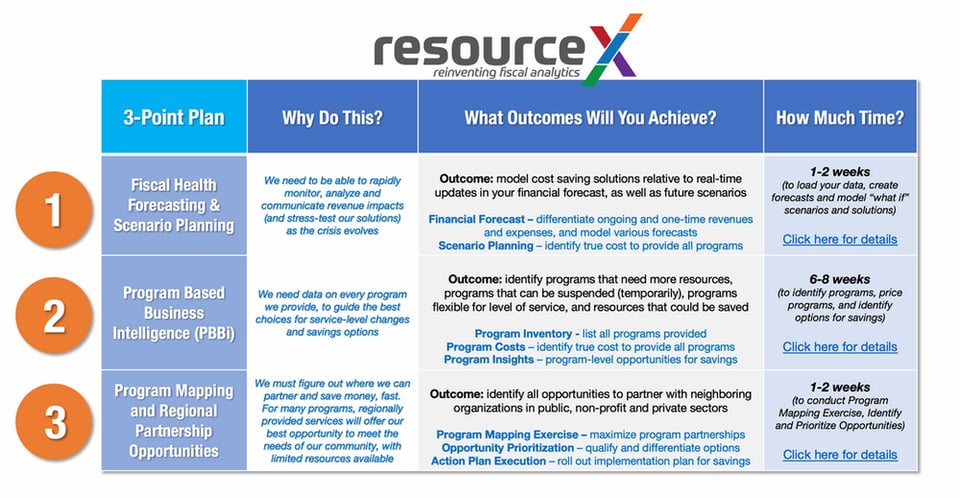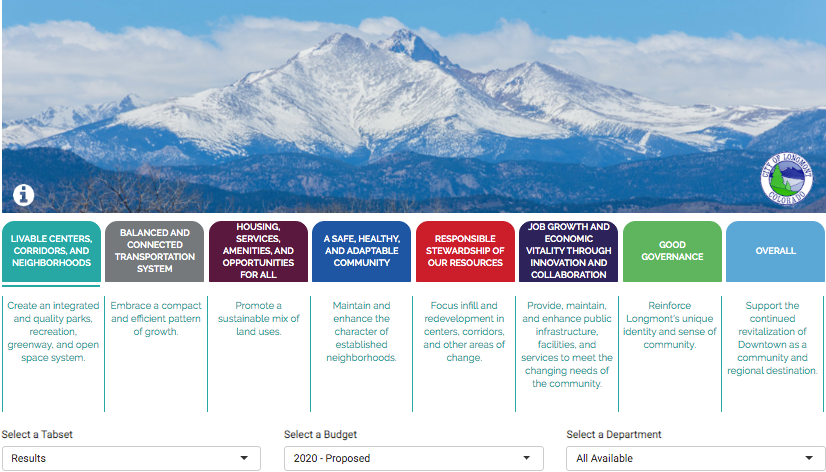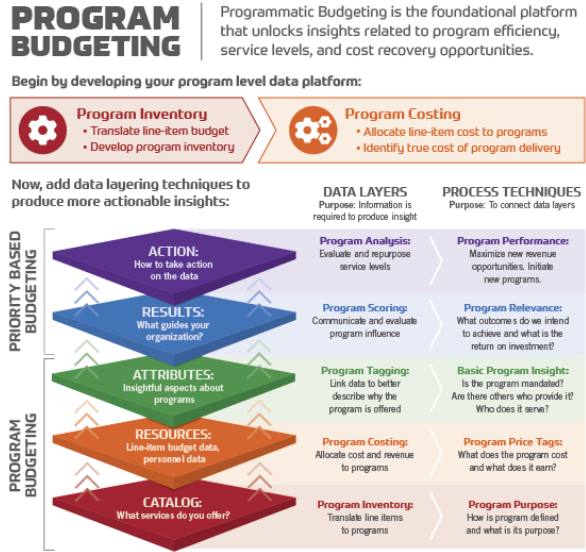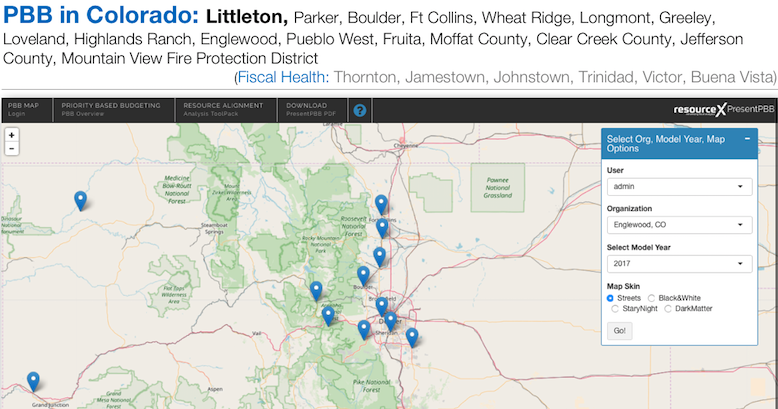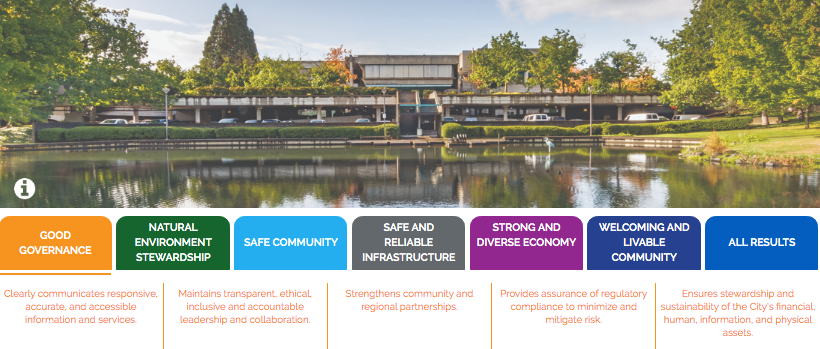Local government needs data on every program they provide, to guide the best choices for service-level changes and savings options – and we need this data as soon as possible, to plan for decisions we must make in the very near future.
We’re going to need to have programmatic data to base decisions on – knowledge of every program offered, the cost of providing the program, level of service, cost recovery, equity measures, degree of mandate in providing the program, opportunity to partner, etc.
This was true before the pandemic, and the devastation COVID has waged on local government budgets simply reinforces the need and demand for program level data for actionable fiscal decision-making.
The great news is we’ve recently spoken with representatives from FEMA who have indicated that our Fiscal Health tool, implementation of Program Based Business Intelligence (PBBi) and Program Mapping services can all be reimbursable under the CARES Act as they would address three key characteristics of eligibility.
First, the tools help to identify service levels and impacts of COVID-19.
Second, they help project and clearly identify revenue shortfalls caused by the COVID-19 induced recession.
Third, they help organizations address continuity of operations planning consideration by attaching personnel to programs that your jurisdiction provides.
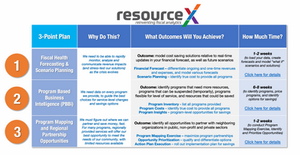
While each state will clearly manage their CARES Act funding eligibility differently, we would suggest that you speak with your State and FEMA representatives to corroborate this information. Given that you have not budgeted for the expense of implementation and it was an unplanned expense to implement our tools, this might help.
For the past four months, we’ve been supporting local governments to create actionable recommendations and decision-packages at the program-level, in order to make the best decisions possible to survive revenue shortfalls brought on by COVID.
With infections on the rise again, and policy makers contemplating periodic returns to shelter-in-place policies, we’ve accelerated the timeline to 1-2 month successful implementations to equip organizations with programmatic data to maximize opportunities for cost savings and revenue generation.
Most recently, clients are using program-level data we work to create for Police Departments, to appropriately analyze what it could mean to re-imagine Police programs, and consider resource reallocation.
Bottom line: two of the most important trends of 2020, COVID-response and Police Department resource reallocation, depend on programmatic data to drive solutions.
Decision Packages: COVID-19
A second wave of infections requiring any further shelter-in-place policy would be devastating to local economies, putting further strain on local government resources and our ability to serve. We have a plan to equip you with programmatic data to drive totally new discussions about service delivery, where we can save and reallocate resources, and opportunities to still generate new revenue.
The next wave of decisions are likely to be based on programmatic data. We need this programmatic data, to open up all options ahead for: a.) programs that need more resources, b.) programs that need to be provided as-is (status quo) c.) programs that can be suspended (even if temporarily), d.) programs flexible for level of service adjustments, e.) internal program partnership and consolidation opportunities, f.) programs ideal for external program partnership g.) programs with revenue generation opportunities (cost recovery, grant reimbursement, regional offering for in-sourcing, etc)
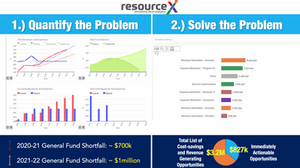
Answers to these questions are levers you can pull if and when you need to, and our proposition is to maximize your options, which require program-level data, and insight creation. Wednesday, July 8th at 2pm eastern, please join us for a free orientation webinar to talk about two paths to work together:
Cohort participation: As we lead multiple orgs through implementation training at the same time, we can dramatically lower the costs. We have proven for 6 organizations that we can deliver a complete data set of programs/services complete with costs, cost recovery, basic program attributes, and decision packages for change (program insights) within 4-weeks. We can actually get there faster if needed, and we can reduce costs as low as $11,500.
One-on-one: we also remain open for rapid implementation for your organization one-on-one.
Cohort #1 successfully launched on June 9th and is well underway through Program Inventory. Onboarding for the Cohort path continues:
July 14th
July 28th
August 11th and further through the year
Requesting Funding
State and municipal governments with over 500,000 population applied for funding directly (this has already happened), while cities and counties of fewer than 500,000 must request funding from their state. The CARES Act requires that payments be used only to cover costs that were not accounted for in the budget most recently approved as of March 27, 2020 (the date of enactment of the CARES Act). Procurement and implementation (go-live date) of ResourceX Fiscal Health tool, implementation of Program Based Business Intelligence (PBBi) and Program Mapping software and services must occur by December 30, 2020.
Funding can be used for a reimbursement of money already spent and can cover costs over multiple months or multiple years (so long that it is paid upfront).
CARES funding has started flowing to state and local governments. The urgent nature of the CARES Act is forcing government leaders to make decisions about how to allocate these supplemental funds quickly.
Contact us to learn more about Fiscal Health tool, implementation of Program Based Business Intelligence (PBBi) and Program Mapping software and services and how CARES Act funding can be used to bring these powerful and effective tools to your community!
Related Resources
Program Based Business Intelligence
Applying Data in Consideration of Repurposing Police Resources and Reimagining Police Services
Addressing the Municipal Fiscal Crisis: A 3-Point Plan
